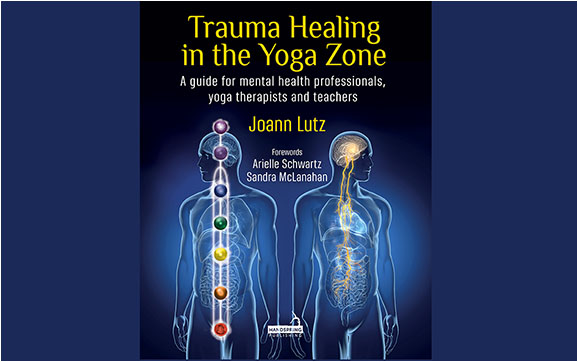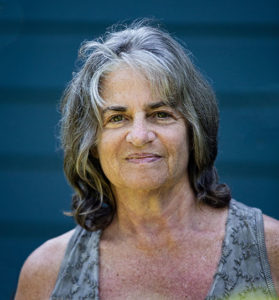 Joann Lutz, MSW, LICSW, C-IAYT, E-RYT
has a new book: Trauma Healing in the Yoga Zone. It is an informative and trailblazing guide for mental health professionals, Yoga therapists and teachers working with trauma utilizing the science of Yoga. In this article, she gives an overview of her journey utilizing Yoga therapy, both personally and professionally. Includes forewords by Dr. Sandra McLanahan (Yoga therapy pioneer and Yogaville’s resident medical doctor) and Dr. Arielle Schwartz.
Joann Lutz, MSW, LICSW, C-IAYT, E-RYT
has a new book: Trauma Healing in the Yoga Zone. It is an informative and trailblazing guide for mental health professionals, Yoga therapists and teachers working with trauma utilizing the science of Yoga. In this article, she gives an overview of her journey utilizing Yoga therapy, both personally and professionally. Includes forewords by Dr. Sandra McLanahan (Yoga therapy pioneer and Yogaville’s resident medical doctor) and Dr. Arielle Schwartz.
Though I have been practicing Integral Yoga for fifty-one years, now is the time to formally introduce myself to the Integral Yoga community. Yoga found me in 1970, at age 21, when I returned home from college in a major depression. Swami Satchidananda became a foster father to me, from afar, with his teachings. I relearned how to eat, breathe, move, and think, and made rapid, permanent progress, in overcoming the “blues.” At that time, I made a vow to myself, that if I ever again felt well, I would share what I had learned from that experience with people who found themselves in a similar situation. The result has been a lifetime of work as an Integral Yoga teacher, psychotherapist, and Yoga therapist.
I had always wanted to share the benefits of Yoga with my psychotherapy clients, but Yoga instruction was outside of the scope of the profession, so I held back until the early 2000s, when Dr. Bessel van der Kolk, world-famous psychiatrist (interviewed in Integral Yoga Magazine’s Summer 2009 issue and posted here on the Magazine’s website), blew the top off of trauma treatment by Introducing Yoga and other innovative treatments at his trauma clinic in Boston, Massachusetts. That was the green light I had been waiting for.
At that point, I turned my attention to the role of the body in trauma healing, and discovered excellent trainings on that topic. While I was learning, I compared that new information, gathered from Western psychologists and researchers, to my knowledge base of Yoga philosophy and practice, and began to see correlations. Eventually, I discovered Polyvagal Theory, developed by Stephen Porges, Ph.D., which describes the physiology that underlies psychological trauma and other psychological/physiological nervous-system dysregulations. He, too, had noticed Yoga’s power to regulate the autonomic nervous system, and included some examples of that in the explanation of his theories.
In this theory, what I had termed as “the blues” could more accurately be described as a state of autonomic nervous system (ANS) dysregulation. Polyvagal theory identifies a hierarchy of ANS responses, beginning with a state of regulation, where an individual feels safe, and their nervous system has the resources to deal with the stresses of their life; to a state of real or perceived threat, which activates the “fight or flight” response of the ANS, in an attempt to defend oneself or leave the situation; to a state of collapse, if self-defense or escape are, or seem, impossible. Yogic interventions help to reestablish the ANS’s regulated state, or, if that’s not possible, to move its defensive state in a more regulated direction.
In my case, the challenges I was dealing with in college, handled without adult guidance or a well-established ability to take care of myself in an unstable political and social environment, overwhelmed my ability to cope. I took action by leaving the situation, but soon, exhausted by so many changes and still not feeling safe, some of my body systems began shutting down. As a result, I found myself sitting on my parent’s couch, staring at the wall, lacking motivation to do anything.
In my presentation at the 2021 Global Yoga Therapy Day Conference, I’ll describe aspects of the Integral Yoga class and breathing practices which I’ve transformed into “nervous system- informed, trauma-sensitive Yoga,” or NITYA, which helped me to turn that dysregulation around. I’ve also compiled my insights into the role of Yoga in trauma healing in a book, “Trauma Healing in the Yoga Zone,” which was published in June, 2021. I am proud to present my findings at the Global Yoga Therapy Day Conference, the culmination of my study and practice of trauma therapy and Integral Yoga.
About the Author:
 Joann Lutz, MSW, LICSW, E-RYT, developer of “Nervous-System Informed, Trauma-Sensitive Yoga,” has 25 years experience as a psychotherapist and 40 years as a Yoga Teacher and Yoga Therapist training mental health professionals internationally for six years, as well as offering a certification program in this approach. She was the initiator and co-chair of the 2016 and 2017 national conferences, “Integrating Yoga into Mental Health Care,” (USA), respectively, and continues to teach trauma-sensitive Yoga classes to special populations. Her new book is available on Amazon and wherever books are sold. Her website is www.yogainpsychotherapy.com.
Joann Lutz, MSW, LICSW, E-RYT, developer of “Nervous-System Informed, Trauma-Sensitive Yoga,” has 25 years experience as a psychotherapist and 40 years as a Yoga Teacher and Yoga Therapist training mental health professionals internationally for six years, as well as offering a certification program in this approach. She was the initiator and co-chair of the 2016 and 2017 national conferences, “Integrating Yoga into Mental Health Care,” (USA), respectively, and continues to teach trauma-sensitive Yoga classes to special populations. Her new book is available on Amazon and wherever books are sold. Her website is www.yogainpsychotherapy.com.
NOTE: Joann Lutz will be presenting at the Global Yoga Therapy Day Conference, Aug. 13, 2021 at 1 pm EDT, on “Tying the knot: Integrating Yoga Therapy and Polyvagal Theory in Mental Health Care.”
Praise for Trauma Healing in the Yoga Zone:
In Trauma Healing in the Yoga Zone Joann Lutz transforms yoga practices into a neurobiological based therapeutic strategy that facilitates and optimizes health through enhanced autonomic regulation. This model, which she labels as Nervous System-Informed Trauma-Sensitive Yoga (NITYA), is the product of an insightful consilience of ancient traditions with contemporary neuroscience. Embracing the model will lead to deeper understanding of the wisdom embedded in Yoga and the powerful neurophysiological impact it may have on rehabilitating mental and physical health.
–Stephen Porges, PhD, distinguished university scientist, Kinsey Institute; Professor, Department of Psychiatry, University of North Carolina at Chapel Hill
In Trauma Healing in the Yoga Zone, Joann Lutz combines ancient wisdom from Yoga with a scientifically informed therapeutic approach for safe and effective trauma resolution. Compulsory reading for anyone interested in healing trauma through neuroscience blended with compassion!
–Shirley Telles MBBS PhD, Director, Patanjali Research Foundation, Haridwar, India
With over 5% of the population experiencing trauma that leads to clinically significant post-traumatic stress disorder, its prevalence is becoming more recognized in society. Neuroscientific research is revealing that this condition is a mind-body disorder, and yet conventional treatments such as psychotherapy focus on cognitive processes and have been only partially effective. This book comprehensively describes the theory and application of Yoga as a mind-body intervention for trauma. It is a welcome contribution to the growing field of trauma-sensitive Yoga that will be of significant use to both patients and therapists.
Sat Bir Singh Khalsa, Ph.D., Assistant Professor of Medicine, Harvard Medical School, Editor in Chief, International Journal of Yoga Therapy
An innovative approach to healing trauma.
–Dean Ornish, M.D.., author, UnDo It! Founder & President, Preventive Medicine Research Institute, Clinical Professor of Medicine, UCSF
These days, when I teach, I hear a common question from yoga therapy students: What’s the evidence for this? Trauma in the Yoga Zone, is the perfect place to send them for answers, and to look them up myself! Joann Lutz does a remarkable job of linking specific practices to their effects on the autonomic nervous system. Each recommended practice is backed up by scientific evidence or, if the data is not yet available, current scientific theory. The research behind why and how Yoga can help trauma survivors heal is invaluable for Yoga therapists and mental health practitioners. I will be referencing this rich compendium of research and practice for years to come!
–Amy Weintraub, MFA, C-IAYT, YACEP, Author of Yoga Skills for Therapists, Yoga for Depression, and the card deck, Yoga for Your Mood.


